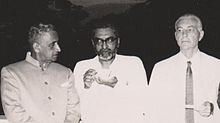- C. D. Deshmukh
-
Chintaman Dwarakanath Deshmukh 
Born 14 January 1896
Nate, Mahad, MaharastraDied 2 October 1982 (aged 86) Nationality Indian Alma mater University of Cambridge Religion Hindu Sir Chintāman Dwārakānāth Deshmukh, CIE (14 January 1896 – 2 October 1982), better known as C. D. Deshmukh, was the first Indian[1] to be appointed as the Governor of the Reserve Bank of India in 1943 by the British Raj authorities. He subsequently served as the Finance Minister in the Union Cabinet (1950–1956).
Contents
Early life and education
Chintaman Deshmukh was born to Dwarakanath Ganesh Deshmukh, a respected lawyer, and Bhagirathibai, a deeply religious lady, on January 14, 1896 at Nata, near Fort Raigarh, Maharashtra. The family was affluent, and of land-holding background with a tradition of public service.[1] Deshmukh had a brilliant academic career: in India he topped the 1912 Matriculation Examination of the University of Bombay and secured the first Jagannath Sankersett Scholarship in Sanskrit. He went on to graduate from Jesus College, Cambridge, England, in 1917 Natural Sciences Tripos (literally, with 3 main subjects) with Botany, Chemistry and Geology; he secured the Frank Smart prize in Botany. Finally, he topped the Indian Civil Services examination in 1918, then held only in London.
Civil service career
Deshmukh joined the Indian Civil Services, and became associated with the Reserve Bank of India since 1939 as its liaison officer to the Government. He then consecutively served as the Bank's Secretary, Deputy Governor (1941–43), and Governor (1943–50).
Bretton Woods Conference
Deshmukh represented India at the Bretton Woods Conference on July 1–22, 1944. The conference led to the establishment of the International Monetary Fund (IMF) and International Bank for Reconstruction and Development (IBRD). He was a member of the Board of Governors of both of these institutions for the next ten years. In 1950, at the Paris conference of these institutions, he served as the Chairman of the Joint Annual Meeting.
Post partition
When British India was partitioned into India and Pakistan in 1947, Deshmukh oversaw the post-partition division of the assets and liabilities of the Reserve Bank between India and Pakistan.
The Indian Government nationalized the Reserve Bank on January 1, 1949. Deshmukh saw through the smooth transition of the Bank from a shareholder’s institution to a national institution.
Union Finance Minister and resignation
Deshmukh held the office of Union Finance Minister from 1950 until 1956 when the Central Government reorganized the states in India on linguistic basis. The Central Government with Jawaharlal Nehru as the Prime Minister made, however, an exception by newly forming the State of Bombay which comprised the neighbouring Gujarati and overwhelmingly Marathi regions, the City of Bombay, the nation's prime economic center, being made the new state's capital.
The large Marathi-speaking majority of the region took as exception to this and wished to have it as a part of the separate Marathi-speaking state to be called Maharashtra; the Gujarati region also being organized as a separate Gujarati speaking state to be called Gujarat.
After the Central Government announced the above scheme, Deshmukh, who was a Maharashtrian, resigned from the office of Union Finance Minister to register his protest against the idea of not letting the City of Bombay be a part of a separate Marathi-speaking State of Maharashtra.
After the Marathi-speaking community's long, four-year struggle under the Samyukta Maharashtra Samiti, the Central Government finally partitioned in 1960, the bilingual State of Bombay into the Marathi speaking State of Maharashtra with the City of Bombay as its part, and the Gujarati speaking State of Gujarat [2]. In 1995, the City of Bombay was renamed as Mumbai.
Personal life
He was first married to an Englishwoman by whom he had a daughter (this marriage ended when his English wife returned to England and the attempt at reconciliation by him in 1946 failed) and later married to Durgabai Deshmukh who was a childless widow and herself a freedom fighter and a member of the Congress Party.
Awards
In 1937, Deshmukh was appointed a CIE (Companion of the Order of the Indian Empire).
In 1944, the British Government bestowed a knighthood upon Deshmukh.
In 1957, he was awarded an honorary Doctor of Science by the University of Calcutta[3].
In 1959, Deshmukh was a co-recipient (along with Jose Aguilar of the Philippines[4]) of the Ramon Magsaysay Award for distinguished Government Service. Jesus College, Cambridge, Deshmukh's alma mater, elected him its Honorary Fellow in 1952 in recognition of his distinguished contribution in the areas of Indian and international finance and administration.
In 1975, the Government of India honored Deshmukh with a Padma Vibhushan award.
References
- ^ a b "Chintaman Deshmukh Memorial Lectures". Reserve Bank of India. http://www.rbi.org.in/Content/Annual_CDMemorial.aspx. Retrieved 2006-12-08.
- ^ "Prelude to storms". Frontline. 2005-05-06. http://hinduonnet.com/fline/fl2209/stories/20050506000508000.htm. Retrieved 2008-01-21.
- ^ Honoris Causa
- ^ "The Ramon Magsaysay Awardees by Name". The Ramon Magsaysay Foundation. http://www.rmaf.org.ph/Awardees/name.htm. Retrieved 2006-12-08.
Government offices Preceded by
Sir James TaylorGovernor of the Reserve Bank of India
1943–1949Succeeded by
Sir Benegal Rama RauPolitical offices Preceded by
John MathaiFinance Minister of India
1951–1957Succeeded by
T. T. KrishnamachariCategories:- Governors of the Reserve Bank of India
- Alumni of Jesus College, Cambridge
- Fellows of Jesus College, Cambridge
- Indian bankers
- Indian civil servants
- Indian Civil Service officers
- Finance Ministers of India
- Marathi people
- Bretton Woods conference delegates
- Recipients of the Padma Vibhushan
- Companions of the Order of the Indian Empire
- Knights Bachelor
- Ramon Magsaysay Award winners
- 1896 births
- 1982 deaths
- Vice-Chancellors of the University of Delhi
- Indian presidential candidates
Wikimedia Foundation. 2010.

